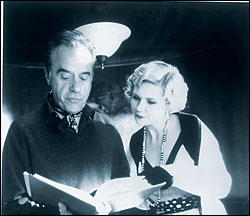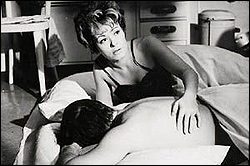“I hope we don’t sound phony and pretentious on this thing,” Wes Anderson says on the commentary for Aquatic (on DVD May 10). Well, let’s see: Anderson and his equally coherent co-screenwriter, Noah Baumbach, repeatedly invoke the names of Fellini, Godard, and Bergman—somehow in connection with themselves—and compare the editing of the pirate attack sequence in Aquatic to the French New Wave. Baumbach’s parents were critics, which may account for some of this posturing, but Anderson learned everything he knows about movies from reading Pauline Kael. He can tell you almost verbatim what Kael wrote about Godard’s uses of text on screen, from titles to images of printed script, so that when Anderson pulls his own camera in close over Ned’s childhood letter to Captain Zissou (just moments before killing the adult Ned in a helicopter crash) he has, as a filmmaker, become nearer my Godard to thee.
Except for a clip of Seymour Cassel effusively rehashing his Cassavetes anecdotes, and a well-spoken interview with the composer Mark Mothersbaugh, poised at the keyboard with a pit bull in his lap (he cradles the beast until it falls asleep with snout on keys), the rest of the extras are noteworthy only for their mindlessness. Anderson, often clad in tweeds and turtlenecks, flits around the film’s impressive Italian locations, looking like a lost child with lank, wispy locks that fall to his chin and a mouthful of jagged, rabbity teeth. Setting the tone for sycophantic idolatry, an intern praises him as “one of my favorite living filmmakers,” while the formidable Anjelica Huston delivers a dubious compliment: “It’s very hard to second-guess [Anderson] or what he’ll want or how he’ll go about it. His refining process is really amazing.”
Deadpan Bill Murray, who in recent years has become a sacred cow for a new generation of hipsters, acts jealous of Cassel. It’s obvious that the jaded Murray resents the older man’s buoyancy, and this is the one time real life pokes through Anderson’s barren world of precocious window dressing.
JUNE 15 BRINGS John Waters’ limp sex satire A Dirty Shame to disc. A Peter Sellers collection includes What’s New Pussycat, and a James Dean set contains East of Eden. Also look for reissues of Casino and Jaws. Bette Davis’ Dark Victory has been transferred from a new print, while Joan Crawford’s Mildred Pierce is also new to DVD. Look for Robert Bresson’s Au Hasard Balthazar, from Criterion. The pick of the week would have to be a new edition of Jules and Jim (also from Criterion), always a reason to fall in love again with the movies.
Eds.





